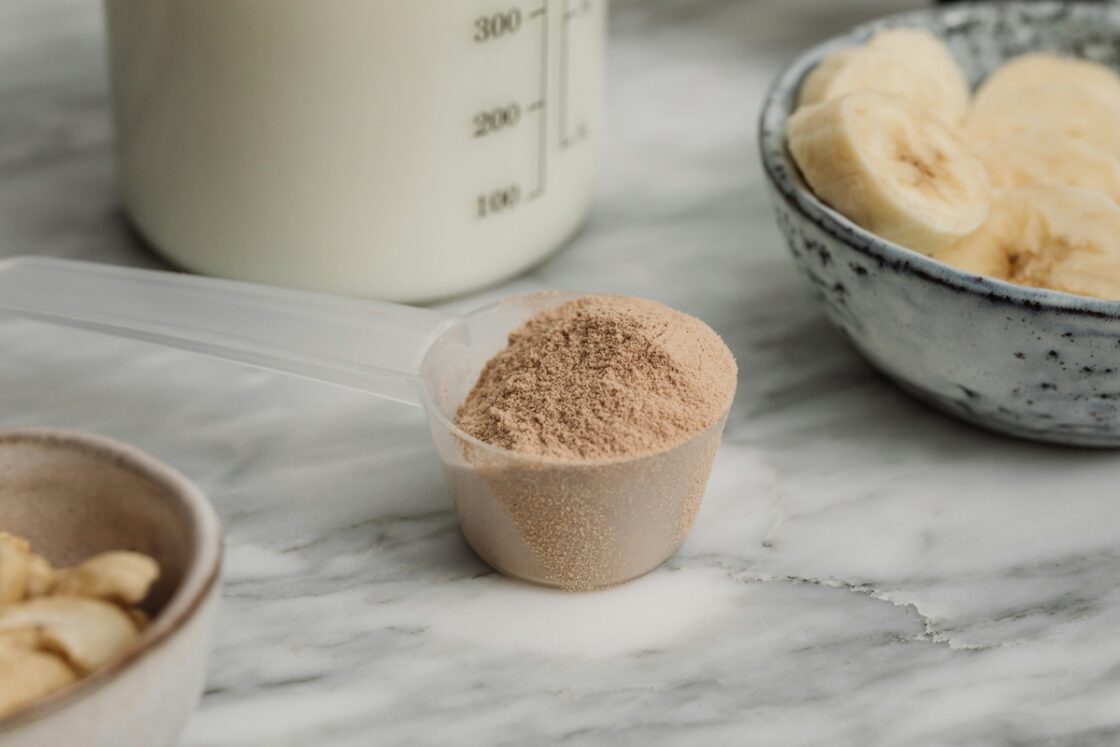
Protein is the macro du jour, when you ask well being and wellness influencers. Throughout social media, private trainers and registered dietitians are actively creating numerous recipes the place cottage cheese and puréed beans stand in for extra conventional cream sauces and protein powder is stirred into desserts, cookies, and pancakes. And it’s not simply people who run in wellness circles — in a 2024 survey of three,000 adults, 71 % stated they have been actively attempting to devour extra protein1.
Right here’s what these influencers gained’t essentially let you know: an extreme consumption of this important macronutrient might find yourself having damaging repercussions in your well being.
However extra isn’t essentially higher, relating to protein. Relying in your gender, age, and exercise degree, you might already be consuming sufficient.
And right here’s what these influencers gained’t essentially let you know: an extreme consumption of this important macronutrient might find yourself having damaging repercussions in your well being.
Are We Consuming Too A lot Protein?
Protein is an important constructing block of our our bodies. As soon as ingested, it’s damaged down into amino acids — lots of that are important to get from meals, because the physique can not produce them by itself. These amino acids are utilized by the physique to construct or restore muscle, contributing to development, good points, and continued well-being.
However consuming an excessive amount of protein can have damaging well being results, notably in your kidneys. In 2024, researchers from Madrid printed analysis in Sports activities Drugs indicating that high-protein diets might result in eventual kidney failure, even in in any other case wholesome individuals2.

The researchers highlighted the really helpful day by day allowance of .83 grams of protein per kilogram of physique weight per day — about 55 grams of protein for a 150-pound lady. For the reason that common protein consumption for People in 2015-2016 was 97 grams for males and 69 grams for girls, it’s very attainable that most individuals are consuming sufficient (or much more than sufficient!) protein.
What Occurs If You Eat Too A lot Protein?
After we devour extra protein than we have to restore our muscle tissues and cells, the remainder is usually burned to provide power. However burning protein results in the buildup of a waste product often known as urea, which have to be filtered out of the bloodstream by the kidneys.
The extra protein you eat, the extra urea you produce, and the tougher your kidneys should work to filter it out. Even wholesome individuals see damaging unwanted effects of an excessive amount of protein, based on 2020 analysis within the Journal of the American Society of Nephrology4. So is an excessive amount of protein unhealthy? Nicely, since 14 % of U.S. adults are estimated to have persistent kidney illness, these results are undoubtedly value holding in thoughts5.
Different Dangers of Protein Overconsumption
Kidney well being isn’t the one potential aspect impact of consuming an excessive amount of protein. In accordance with 2016 analysis in Meals & Perform, persistent excessive protein consumption (outlined as greater than 2 grams per kilo of physique weight) might additionally result in vascular abnormalities6.
Overconsumption of protein may also result in weight achieve7 or digestive abnormalities like constipation8 or diarrhea. It could possibly even trigger the event of dangerous metabolites that may result in gastrointestinal issues9, notably if a high-protein weight-reduction plan doesn’t additionally include enough fiber. And a few research have discovered {that a} larger consumption of protein, notably animal protein, might contribute to elevated danger of breast most cancers10 and kind 2 diabetes11.
An Argument in Favor of Extra Protein

Not everyone seems to be as cautious of the dangers of consuming an excessive amount of protein. Carolyn Ketchum, creator of the forthcoming The Protein Benefit, notes that whereas the our bodies of youthful adults use protein extra effectively, many specialists imagine that older adults might have a bit extra.
“The lack of lean muscle mass begins in our thirties and will increase exponentially over time,” she says, “and resulting from a phenomenon often known as anabolic resistance, older adults want extra day by day protein to keep up the identical quantity of muscle as youthful people.”
“[Daily protein recommendations] have been by no means meant to be the optimum or goal quantity of any nutrient. As an alternative, it refers back to the least quantity a person ought to devour.”
Carolyn Ketchum, creator of The Protein Benefit
Day by day protein suggestions, she continues, are an insufficient measure of the true consumption of a given nutrient every particular person actually wants, seeing as they’re generalized to your complete inhabitants, no matter age, gender, and exercise degree. “It was by no means meant to be the optimum or goal quantity of any nutrient,” she says. “As an alternative, it refers back to the least quantity a person ought to devour.” In different phrases, the query of how a lot protein you must eat in a day ought to be dealt with on a person degree.
She cites a rising physique of analysis, together with a 2023 analysis assessment in The Journal of Diet12 and a 2022 analysis assessment in Ageing Analysis Evaluations13, that signifies that extra protein — maybe even double the quantity at the moment really helpful — may very well be a greater goal for older adults.
Certainly, larger day by day protein consumption has proven to scale back frailty in older ladies, based on 2011 analysis within the Journal of the American Geriatric Society14. A 2016 report in Meals & Perform indicated that whereas 1.6 g of protein per kg of physique weight was ideally suited for individuals doing intense bodily exercise15, “Lengthy-term consumption of protein at 2 g per kg BW per day is protected for wholesome adults, and the tolerable higher restrict is 3.5 g per kg BW per day for well-adapted topics.”
Protein Isn’t a Magic Bullet

However even Ketchum notes that protein is much from the answer to all our ills. “It’s human nature to desire a magic bullet, the one factor that cures all of the ills and solves all the issues,” she says. “Many individuals tend to go overboard. Simply rising protein with out contemplating your different vitamins or getting some train isn’t going to magically make you wholesome and robust.”
She notes, quite the opposite, {that a} high-protein weight-reduction plan have to be coupled with train to reap the complete advantages. “The connection between protein consumption and bodily exercise is a extremely synergistic one,” she says. “To have interaction in a single with out the opposite is addressing solely a part of the equation. Finished in tandem, they create a constructive suggestions loop that helps preserve and even construct lean muscle mass properly into our sixties and seventies.”
Easy methods to Supply Your Protein
The protein renaissance has led to a plethora of protein powders on {the marketplace}, providing a easy method to incorporate extra of this nutrient into your weight-reduction plan. However whereas some protein powders are cleaner than others, on the entire, Ketchum is cautious of an over-reliance on these extremely processed sources of the macronutrient.
“There’s nothing inherently unsuitable with protein powders, they usually might help fill in any dietary gaps when life will get busy,” she says. However she additionally notes that many are full of sugars and components. Some protein powders have even been discovered to include heavy metals like lead. She recommends sourcing clear protein dietary supplements and consuming them mindfully. “Use them along with, fairly than as a substitute for, wholesome excessive protein meals,” she says.

As an alternative, she recommends getting most of your protein from high-quality, entire meals sources like meat, cheese, and eggs (which have lately been vindicated by the FDA to be included within the new definition of “wholesome”). The very best sources of protein are usually pure. Plant-based protein sources like chickpeas, lentils, and beans have additionally been discovered to have much less affect on linked well being points like elevated danger of breast most cancers and kind 2 diabetes. Selecting your protein sources mindfully, and pairing protein with different important vitamins like fiber and wholesome fats, will result in the perfect, most holistic dietary strategy.
Sources:
- https://foodinsight.org/wp-content/uploads/2024/06/2024-IFIC-Meals-Well being-Survey.pdf
- https://pubmed.ncbi.nlm.nih.gov/39196487/
- https://www.ars.usda.gov/ARSUserFiles/80400530/pdf/DBrief/29_Protein_Intake_of_Adults_1516.pdf
- https://pmc.ncbi.nlm.nih.gov/articles/PMC7460905/
- https://www.cdc.gov/kidney-disease/php/data-research/index.html
- https://pubs.rsc.org/en/content material/articlelanding/2016/fo/c5fo01530h
- https://www.clinicalnutritionjournal.com/article/S0261-5614(15)00091-6/summary
- https://pubmed.ncbi.nlm.nih.gov/38651659/
- https://asm.org/press-releases/2024/june/high-protein-diet-impact-gut-microbes-body-comp
- https://pmc.ncbi.nlm.nih.gov/articles/PMC7768926/
- https://pmc.ncbi.nlm.nih.gov/articles/PMC6893550/
- https://www.sciencedirect.com/science/article/pii/S0022316623725297
- https://pubmed.ncbi.nlm.nih.gov/36087703/
- https://pmc.ncbi.nlm.nih.gov/articles/PMC2924946/
- https://pubs.rsc.org/en/content material/articlelanding/2016/fo/c5fo01530h

